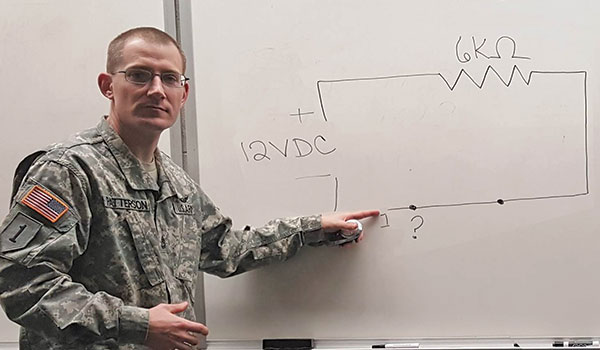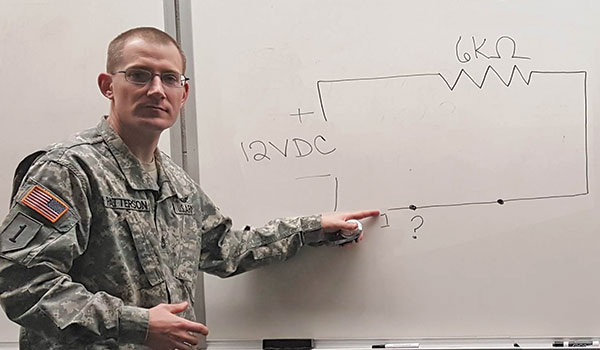
128th Aviation Brigade / By SFC Douglas J. Patterson: The American Soldier comes from all walks of life, from every different region, culture, religion, that makes up our great nation and some even come from other countries.

The author teaching Ohms Law to students during the Basic Electronics Training block of the 15Y AIT course. / 128th AVN BDE PHOTO BY SSG RANDY BARTZ
Soldiers hold a special bond with each other, especially in their initial entry training when civilians are learning to become Soldiers. I am sure most all of us can remember that one drill sergeant or AIT NCO who had a lasting impact on us.
When that newly minted Soldier steps off the bus at Initial Military Training (IMT) they carry with them different values, beliefs, and views of the world many far divergent than those desired by our Army. It then is the mission of our IMT formations to forge them into American Soldiers. Soldiers ingrained with a set standard of ethics, beliefs and values that will guide them through the difficulties and uncertainties that are found in no other profession but ours; difficulties and uncertainties that only warfare brings. From the first day of Basic Combat Training, Soldiers are immersed in Army Values and Ethics training. These values and ethics breed mutual trust and set a foundation for the acceptable behavior Soldiers can expect from each other and their leaders throughout their career. IMT instructors are some of the first Non-Commissioned Officers (NCOs) that new Soldiers interact with upon arrival at Advanced Individual Training (AIT). These NCOs spend more time in the academic setting with the new Soldiers daily mentoring them than the AIT Platoon Sergeant counterparts. How we interact with them will directly influence their expectations of their future leaders and have a profound impact on the type of leader they become.
Relating and Setting the Example
As instructors, we must be able to relate to the current generation of Soldiers while continuing to uphold the Army’s time honored traditions and values of our predecessors. Our job needs to start long before we even enter the classroom on Monday morning. A good NCO can’t, in good conscience, teach or hold Soldiers to the Army’s standard if he/she is not willing to follow the standard themself. We must ensure that our physical appearance and uniforms are within Army regulations, because if we show up to teach and aren’t within regulation, we immediately lose credibility with the very Soldiers it is our duty to train. Instructors must demonstrate that we are Soldiers of character and professionalism every day so that the Soldiers know we are holding them to our own same high standards. Soldiers emulate what they are taught. This starts with looking like a Soldier and continues into how you conduct yourself in all aspects of your life, from off duty, to the classroom/duty environment, to the motivation and drive you display on the PT field.
Mentoring
A successful instructor mentors his/her students to embody the values, ethics, and 21st Century Soldier Competencies by seamlessly integrating them into their lessons and daily interactions without thinking about it. It’s not enough to just teach Soldiers MOS skills, but to create thinkers and doers. Critical thinking skills need to be developed by facilitating discussions, having Soldiers research the manuals, and developing their own conclusions instead of just giving them the answers. This enhances a Soldiers ability to not just regurgitate information, but to actually apply and understand what they’ve learned. Teamwork and collaboration are taught during practical exercises by placing students in situations where they need to work together to solve complex problems. This fosters a sense of loyalty, commitment to each other, and confidence in everyone’s abilities.
Our branch and our Army must assign the best and brightest NCOs to be IMT Instructors. We are training the future generations; whether they stay one enlistment or make it a career, they are the future. The Soldiers we train today will eventually grow and lead the next generation of Soldiers. It’s the duty of each IMT instructor and NCO to ensure these Soldiers get the best possible training and that we’re sending our peers in the operational Army the most competent and committed Soldiers possible. While not glamorous, as instructors we need to continue to take this tremendous responsibility seriously every day.
SFC Douglas J. Patterson is a 15Y Senior Instructor/Writer with Company A, 1st Battalion, 210th Aviation Regiment, 128th Aviation Brigade at Joint Base Langley-Eustis, VA.







